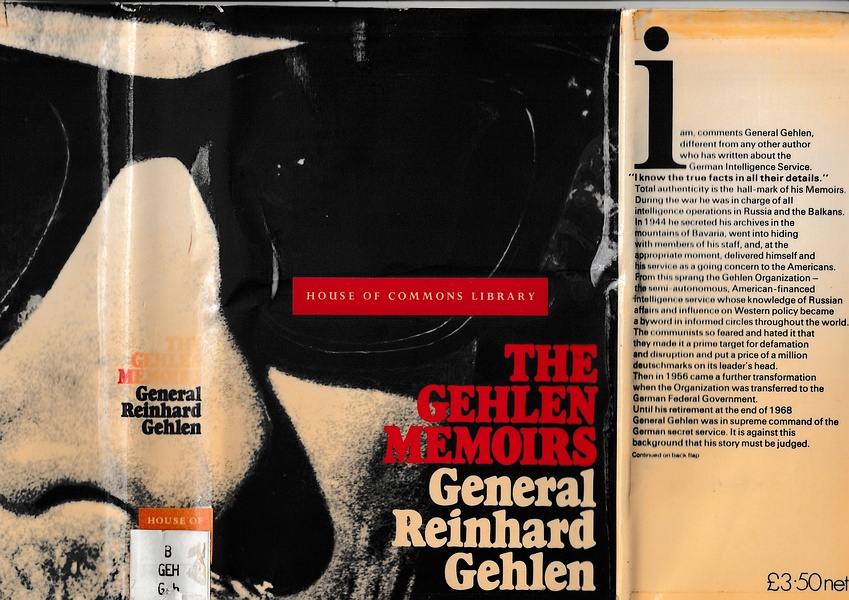
Short Review by Chris Caskie of The Service: The Memoirs of Reinhard Gehlen. New York: The World Publishing Company, 1972. Translated by David Irving.
I was recently looking at the memoirs of Reinhard Gehlen, who was chief of the Wehrmacht Foreign Armies East military intelligence in WW2. [Downloaded from a site b-ok]. He reflects on supposed mistakes. He also discusses how ex-Nazis collaborated with American intelligence agencies like the CIA after WW2, to incite false flags, etc, in Europe to perpetuate the communist vs nazi divide and rule. It's called 'Operation Gladio'. It suggests international Jewish cooperation. This book is roughly in two parts. The first part looks at the Second World War from Gehlen’s vantage point as the head of German intelligence on the Eastern Front. I read this part with RW and Hexzane527’s hypothesis about WW2 in mind, which reconsiders German mistakes to be deliberate sabotages, rather than oversights. This will sound ridiculous prima facie, but it’s logical and in line with Jewish motivations and manoeuvres in every field, in every country, for millennia.
The second part of the book deals with post-1945 intelligence agencies and the ‘cold war’. Naturally, nuclear propaganda features strongly. I found a lot of this material to be outdated. This was Gehlen commentating and speculating about current events, rather than recalling his own experiences, and I don’t think he had much to say.
I have selected some excerpts from the book below, which illustrate the huge mistakes (or sabotages) made by the Third Reich:
Page 24: “Instead of weighing carefully each step he took, he [Hitler] began a dangerous poker game and shut his eyes to the fact that sooner or later he would be dealt a losing hand. Even in 1939 he did not deserve to win. Our forces were nowhere near ready for war, and if the Allies had shown resolution in their political and military actions when war broke out, there would have been at most a short period of armed conflict followed by the defeat of Germany, a defeat which seemed certain from the outset. ... even by the summer of 1939. ... Our stocks of heavy-artillery ammunition—including that of the heavy field howitzers—were virtually exhausted.”
In other words, if the USA had joined WW2 earlier, Germany would’ve easily been defeated. Hence, it wasn’t until late 1941 when the USA joined. Hexzane527 wrote a piece about this:
https://big-lies.org/hexzane527/why-was-war-between-usa-and-germany-put-off-till-1941.html
Hitler defenders sternly maintain that the USA, UK, USSR were basically run by Jews and banded together to crush Germany. If this is the case, hexzane527 points out, why didn’t America enter the war until late 1941?
Page 31: “In the opinion of the chief of staff, General Haider, our attack ought to be centered on Moscow. In addition to the psychological effect, the capture of Moscow would even then, in 1942, deprive the Soviet empire of its political nerve center and main transportation center. Hitler insisted on an offensive in the direction of Stalingrad—to eliminate the Volga as a waterway—and the Caucasus. Hitler’s argument was that the capture of the oil fields there would decide the war: without them, Germany’s fuel supplies would dry up within six months. This prediction turned out to be wrong, for even without the Caucasian oil fields we were able to keep fighting for two and a half years more.”
Hitler commanded the German forces to turn back when they were 15 miles away from Moscow. In fact, there is a monument there today, marking the farthest distance of the German forces:
https://commons.wikimedia.org/wiki/Category:Ezhi_monument
There’s a map feature on the website and it’s just a stone’s throw away from Moscow. I haven’t been able to find the official reason for the order to turn back, but the decision was highly suspect.
Page 60: “[The events of Stalingrad] have resulted from a sequence of basic command errors on our side, as to whose extent and effect the military authorities were perfectly aware from the moment they were committed.”
There’s a strong possibility Gehlen was a Jew and was not letting on as much as he knew. If the military was aware of these errors, then why commit them?
Page 66, regarding the deathtrap of Kursk: “Hitler repeatedly postponed the date, first for one reason, then another, while the Russians, who were fully aware of our intentions, took the appropriate measures and prepared a daunting system of defenses extending some 150 miles back from the front line. With each week that passed our prospects of success lessened; whereas initially the War Department and my own branch had been confident of victory at Kursk, by late June we were confident of defeat.”
Page 84: “Hitler, however, lacked all sense of reality. He was either unable or unwilling to deviate from his faulty political and military intentions for the conduct of the Russian campaign. Neither Haider nor Zeitzler was able to change his views.”
Of course, many historians have puzzled over Hitler’s actions or inactions. I think we have an answer now, some 75 years later...
Regarding the second half of this book, I think it is worth making a parallel with intelligence infiltrations during the ‘cold war’ and infiltrations into ostensibly credible movements today.
The best parallel is ‘Operation Gladio’. Long story short, a good cop/bad cop routine where intelligence agencies, principally based in America and Europe, would fund and support secret militias and movements to combat ‘communism’. This included the recruitment of former Nazis who were let off the hook after WW2. People failed to notice this at the time and decades after the event, it’s still ignored by all media. Of course, 6 million dead Jews are more important! At the time of writing, there are very few books available about ‘Operation Gladio’, if any.
Nowadays, the ‘Alternative Right’ is like an updated dialectic à la Gladio. Here is a good article outlining the intimate links Jews have to this movement:
https://archive.ph/0nHR3 (Note archive.ph now seems better than archive.org since the latter are now deleting anti-Jewish web pages).
The same divide and rule applies to the current Russia-Ukraine War, which I do not know to what extent this is a war versus skirmishes. Many people, including genuine people, pose as nationalists while cheering the war in one way or another. Has it occurred to them that invasions such as those by the Third Reich or by Russia into Ukraine are incongruous with the nationalistic and sovereign wishes of other nations? These should be respected and upheld.
Many desperate people cling to Putin as a saviour when he is obviously corrupt, having evaded term limits several times. Of course, Putin has a background in the KGB, the same mass murdering organisation (under a new moniker) that Jews spearheaded in the USSR. Putin introduced ‘Holocaust’ denial laws in recent years and can be seen in photographs wearing a silly Jewish kippah. He never did anything about the Jewish mafia in Russia. It’s easy to adduce data showing that the Russian government is a Jewish cabal like the American government. Looking back, the Third Reich looks like no exception. Sadly, history repeats itself.
Chris Caskie, 15 May 2022
The Gehlen Memoirs by Reinhard Gehlen (1972). Translated from the German by David Irving. Published by William Collins & Son, Glasgow and London.

I bought a copy of 'The Gehlen Memoirs'. (Published by William Collins, London, 1972 & World Publishers, New York (c) Reinhard Gehlen, Berg, Germany 1971). Collins had a branch in Auckland; the book must have been known in New Zealand. My copy had been in the House of Commons library!
Gehlen comes across to me as smug and more interested in his life and work and status than anything else. He sounds like a career intelligence person, scarcely concerned with Germany's defeat, or the ruin of war. He also looks to me like a Jew, in fact. Unlike many other Germans, he was not apparently mistreated in any way. Compare for example the fate of Höss.
I found a quotation by Caskie in this book, but the pagination is different; 'The Service' looks like the shorter edition by v. Hase und Koehler Verlag, Mainz, Germany, 1971. The translator (if it was in English) is not given.
My copy has 12 pages (i.e. 6 leaves, with 1 to 4 photos per page. All b/w and all not very good).
3 of the 4 chapters are post-1945, which itself is interesting and astonishing. Amazing stuff, really; he says German Intelligence was in communication with USSR intelligence! 'For reasons the German public wouldn't understand' or something like that. He talks about the CIA, founded after WW2, and his excitement in his air travel to the USA, the first time he'd visited.
Gehlen doesn't sound like a victim of the 'Allies', desperate to keep alive. The blurb says ‘I am, comments General Gehlen, different from any other author who has written about the German intelligence Service. "I know the true facts in all their details. ..." Anyone interested in huge conflicts might like to try estimating from the book what really happened.
Rae West 15 May 2022
HTML, research Chris Caskie & Rae West 15 May 2022